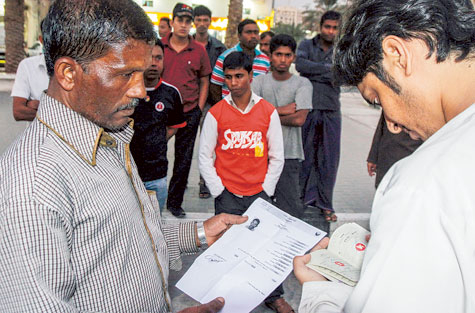
Dubai: Holding an exit permit in one hand and an expired passport in the other, a frail looking Mir Hossain, a Bangladeshi approaches a passer-by for help. “I am an illegal. I have already got myself an exit permit please help me to get a one way air ticket to my home country.”
His pleas are met with a frown and he is warned to get out of the way or else he will be handed over to the police.
An apologetic Mir dashes off across the street to join a group of men who, from a distance looked like enjoying the cool winter outdoors after a hard day’s work.
But as you go closer you will find that these men are all illegals. They gather at the same spot near the clock tower in Sharjah every evening debating on whether or not they should take advantage of the amnesty period. They are mainly from India, Pakistan, Bangladesh and Sri Lanka.
Like Mir, these men have entered the country many years back legally by paying huge sums in their respective countries to recruitment agents to eke out a better future for their families back home.
With only a fortnight remaining for the amnesty period to end many among them have opted to stay back not because they don’t want to return back to their home country but because of lack of funds or lack of information. The two-month amnesty period which started on December 4, 2012 ends on February 3 this year.
Sounding desperate Mir said: “My visa expired some five years back. You are from the newspapers and I am sure you can help me or provide me with some guidance on how and where should l go to get funds to buy an air ticket.”
According to his passport he was born in 1973 but Mir looked much older. “What should I do now? If I don’t get the money for the ticket, I am going to stay back and carry on as an illegal. I earn Dhs40 to Dhs50 or at times even less than that on a single day by freelancing as a carpenter. I have to take care of my food and the bed-space.”
Similar is the case of Shahid who also hails from Bangladesh. He turned illegal four years back. Taking out a consular fees receipt from his wallet that said: “I paid Dh203 to process my papers.” When asked about the papers that he is getting processed he said: “I think it is to get out of the country. I will go next week to find out if it is ready. My entire day goes wasted travelling to Dubai, in other words there is no earning. I can’t afford taxi fare so I take a bus. I want to go back but if the procedures involved prove tedious I might just stay back. Let the police catch me and put me in jail. Many of us wish to get arrested by police and get deported.”
Listening attentively to what Shahid had to say, Doraiswamy, an Indian who was standing in the crowd, came forward and proudly announced that he came to the UAE in 1996 and that he has been an illegal since 1999. “It is good that the government has announced amnesty but I refuse to take it,”
“Why?”
To which he replied: “I have been in this country for over 15 years. I came to this country on a valid employment. I worked really hard as a mason on a construction site. Some labour problem happened over there. I got my passport, left the construction company and ever since I have been working as daily wage earner. On a lucky day I end up earning Dh70 to Dh100. All these years I have not gone home,”.
When asked about his family back home and whether he was able to improve their financial status, Doraiswamy, smiled and preferred not to talk about it.
Gulf News also came across women domestic helpers who have been working as part time despite being illegal. They work in several homes in a single day and earn about Dh 1500 to Dh 2000 on monthly basis. This is despite a strict law being in place under which heavy penalties are also imposed on all those who employ these illegal domestic helpers.
Nalini, 52, a Sri Lankan domestic helper, has no plans to make use of the amnesty period. She plans to return to her home country in couple of years.
“I came here in 1999 on a valid visa to work as a domestic help in an Asian family. I used to get paid Dh 650 in salary. The family treated me well but when I got to learn that working as part-time domestic help will earn me more money, I absconded. Today, I earn Dh 1500 monthly. It all depends on the number of houses that I get to work for.”
Nalini said she came to UAE after the death of her husband who used to work as a policeman in Colombo. “He was the bread earner of the family. No doubt I had to work really hard but with the money that I earned in this country. I got my daughter educated. She is a civil engineer today. Her wedding took place last year in June to a good man who works in the same company where she is employed in Colombo. They fell in love.”
Not the one to be a dependent on her daughter and her son-in-law, Nailini today earns to save some money for herself. “If I go back, I don’t think I will be able to earn what I earn over here. Just a couple of years more and then I will go back and spend my old age with my daughter. I want to financially independent,” she said.
But what about this constant fear of being caught by the police. “If I get caught, I will be put in jail and deported but up until then let me work,” she said.











